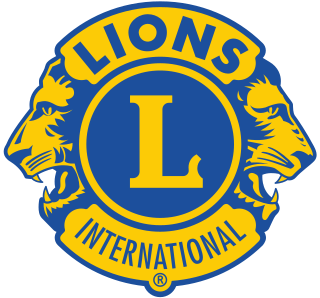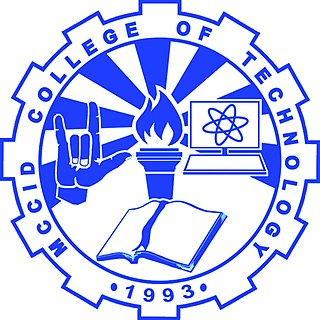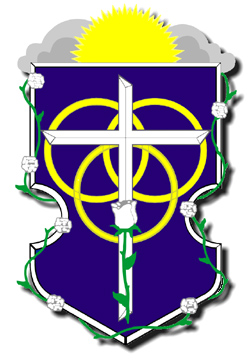
Lions Clubs International, is an international service organization, currently headquartered in Oak Brook, Illinois. As of January 2020, it had over 46,000 local clubs and more than 1.4 million members in more than 200 countries and geographic areas around the world.

Rotary International is one of the largest service organizations in the world. The mission of Rotary, as stated on its website, is to "provide service to others, promote integrity, and advance world understanding, goodwill, and peace through [the] fellowship of business, professional, and community leaders". It is a non-political and non-religious organization. Membership is by application or invitation and based on various social factors. There are over 46,000 member clubs worldwide, with a membership of 1.4 million individuals, known as Rotary members.

Civitan International, based in Birmingham, Alabama, is an association of community service clubs founded in 1917. The organization aims "to build good citizenship by providing a volunteer organization of clubs dedicated to serving individual and community needs with an emphasis on helping people with developmental disabilities." The organization includes 40,000 members in almost 1,000 clubs around the world.
Kiwanis International is an international service club founded in 1915 in Detroit, Michigan. It is headquartered in Indianapolis, Indiana, United States, and is found in more than 80 nations and geographic areas. In 1987, the organization began to accept women as members. Kiwanis and its affiliated clubs have more than 600,000 members. Kiwanis clubs raise over $100 million each year and report over 18.5 million volunteer hours to strengthen communities and serve children.

Emerson College is a private college with its main campus in Boston, Massachusetts. It also maintains campuses in Hollywood, Los Angeles, California, and in Well, Limburg, Netherlands. Founded in 1880 by Charles Wesley Emerson as a "school of oratory," the college offers more than three dozen degree and professional training programs specializing in the fields of arts and communication with a foundation in liberal arts studies. The college is one of the founding members of the ProArts Consortium, an association of six neighboring institutions in Boston dedicated to arts education at the collegiate level. Emerson is also notable for the college's namesake public opinion poll, Emerson College Polling.

Fraternal Order of Eagles (F.O.E.) is a fraternal organization that was founded on February 6, 1898, in Seattle, Washington, by a group of six theater-owners including John Cort, brothers John W. and Tim J. Considine, Harry (H.L.) Leavitt, Mose Goldsmith and Arthur Williams. Originally made up of those engaged in one way or another in the performing arts, the Eagles grew and claimed credit for establishing the Mother's Day holiday in the United States as well as the "impetus for Social Security" in the United States. Their lodges are known as "aeries".

The Veterans of Foreign Wars (VFW), formally the Veterans of Foreign Wars of the United States, is an organization of United States war veterans who fought in wars, campaigns, and expeditions on foreign land, waters, or airspace as military service members. Established on September 29, 1899, in Columbus, Ohio, the VFW is headquartered in Kansas City, Missouri. It was federally chartered in 1936.

Epsilon Sigma Alpha International (ΕΣΑ) is an International community and collegiate coeducational service organization. Established in 1929, Epsilon Sigma Alpha is a network of an estimated 10,000 members in over 1,000 community-based chapters, with coordinating organizations at state and international levels. ΕΣΑ also includes United States collegiate chapters that provide charitable service to their campuses and communities.
A communicative disorders assistant (CDA) performs hearing and speech-language screenings, prepares therapy materials, implements speech therapy, reports on therapy outcomes, performs routine maintenance on clinical equipment, and works with speech-language pathologists (SLPs) and audiologists to adjust therapy goals. While CDAs cannot perform assessments or set therapy goals, they are a vital part of the therapy team. CDAs are supervised by and work in conjunction with SLPs and audiologists.

Kappa Delta Chi Sorority, Inc. (ΚΔΧ), also known as K-D Chi, is a Greek letter, intercollegiate Latina sorority founded at Texas Tech University in 1987. It is a member of the National Association of Latino Fraternal Organizations.

Manila Christian Computer Institute for the Deaf (MCCID) is a non-sectarian, post-secondary, Christian foundation school for the deaf in the Philippines authorized by the Technical Education and Skills Development Authority (TESDA) to offer non-degree computer and other technical training programs.

Alpha Omega Epsilon (ΑΩΕ) is a social and professional sorority for women in engineering and technical sciences. The sorority was founded at Marquette University in 1983. There are 48 active chapters of the sorority.
Malcolm Hough Fraser (1903–1994) was an American businessman. He founded the Genuine Parts Company with his brother in 1928 and the Stuttering Foundation of America in 1947, giving the latter most of its $10 million endowment. He was the recipient of the fourth annual National Council on Communicative Disorders Distinguished Service Award in 1984.

The Stuttering Foundation of America provides free online resources, services and support to those who stutter and their families, as well as support for research into the causes of stuttering. A 501(c)(3) nonprofit organization, The Stuttering Foundation was established by Malcolm Fraser in 1947 in Memphis, Tennessee. The Stuttering Foundation provides a toll-free helpline, free printed and online resources including books, pamphlets, videos, posters, referral services, support and information for people who stutter and their families, and research into the causes of stuttering.
Richard Morgan Downey is an American obesity advocate, consultant, and editor of the Downey Obesity Report. Downey is the former executive director of the American Obesity Association, and has been actively involved in the obesity field since 1998. He organized the first conference on obesity as a public policy issue in 1999, and has testified before Congressional Committees; in addition, he has approximately 20 professional publications and has been featured in the New York Times, the Washington Post, and the Wall Street Journal, and has been interviewed on The Today Show and NPR.
The Hong Kong Federation of Youth Groups is a non-profit organization in Hong Kong, committed to develop youth services. Founded in 1960, the Federation has since been involved in providing activities and facilities for the physical, social, educational, cultural development of Hong Kong's youth.
Bonnie Brinton is a speech language pathologist, a professor at Brigham Young University (BYU), and from 1999 to 2009 was dean of the BYU graduate school.
Unbound, formerly Christian Foundation for Children and Aging, is a nonprofit international development organization headquartered in Kansas City, Kansas. Unbound was founded by lay Catholics acting on the Gospel call to serve the poor. Its sponsorship program provides direct cash transfers to sponsored members who determine how to use their cash benefits to meet their goals. Beyond basic necessities such as food, housing, clothing and access to medical care, sponsored members frequently utilize their benefits to pay for education costs or to start or expand small business ventures. Unbound sponsors support more than 260,000 children, youth and elders in 17 countries.

Quota International, Inc. was an international service organization that, until it dissolved in 2020, provided basic needs to women, children, the deaf, and hard of hearing in communities around the world. Quota International's world service projects were aligned with the United Nations' Millennium Development Goals. Specifically, Quota clubs worked towards UN MDG Goals 1 and 3: to eradicate extreme poverty and hunger, and to promote gender equality and empower women, respectively. The organization was founded in Buffalo, New York, in 1919 by Wanda Frey Joiner, as a service club for women similar to that of popular all-male clubs.
HASA is a social benefit 501(c)(3) organization located in Baltimore, Maryland, that specializes in facilitating communication. Established in 1926, the organization provides special education services through Gateway School, audiology and speech-language services through its Clinical Services Department, and interpreting services for the deaf through its CIRS Interpreting Department.










